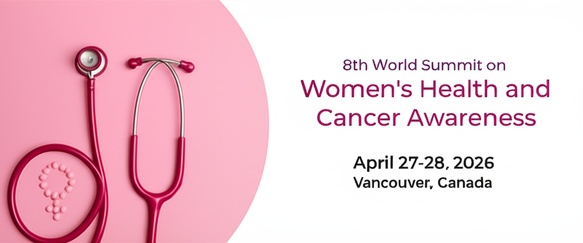Sessions and Tracks
Track 1: Gynecologic Oncology: Diagnosis, Treatment & Precision Medicine
This session highlights the latest developments in gynecologic oncology, focusing on cancers affecting the cervix, ovaries, uterus, vulva, and vagina. Emphasis will be placed on advanced diagnostic tools such as HPV screening, genetic testing for BRCA and Lynch syndrome, and molecular profiling to guide individualized treatment plans. The session will explore innovative therapies including targeted treatments, hormone therapy, and immunotherapy, as well as minimally invasive and fertility-preserving surgical approaches. Attendees will also discuss survivorship care, encompassing physical recovery, fertility concerns, and mental health. A critical aspect will be addressing global disparities in cancer care and increasing access to early detection and treatment, particularly in low-resource settings. The use of artificial intelligence and digital health tools in early diagnosis and personalized care will be examined. This session provides a multidisciplinary platform to share research, improve outcomes, and promote equitable care in women’s cancer treatment.
Keywords: gynecologic cancer, cervical cancer, ovarian cancer, endometrial cancer, vulvar cancer, HPV screening, Pap smear testing, BRCA testing, Lynch syndrome, genetic counseling, personalized oncology, targeted therapy, hormone therapy, immunotherapy, precision medicine in cancer, molecular diagnostics, robotic-assisted surgery, minimally invasive gynecologic surgery, fertility preservation, oncofertility, cancer survivorship in women, tumor profiling, chemotherapy advancements, radiation therapy, AI in cancer diagnosis, digital health in oncology, women's health equity, clinical trials in gynecologic oncology, cancer care disparities, global women’s cancer care.
This session will focus on the evolving landscape of breast cancer care, from prevention and early detection to survivorship. With breast cancer remaining the most commonly diagnosed cancer in women worldwide, advancements in screening and risk-reduction strategies are more critical than ever. Key topics include the role of genetic testing (such as BRCA1/BRCA2), lifestyle-based prevention, and the use of advanced imaging technologies like 3D mammography, ultrasound, and MRI in early detection. The session will also explore personalized treatment options including targeted therapy, immunotherapy, and hormone therapy tailored to tumor subtypes. Emphasis will be placed on patient-centered survivorship care—addressing physical, emotional, and psychosocial recovery, as well as long-term monitoring and recurrence prevention. Participants will also examine global disparities in access to screening and treatment, and innovative models for supporting survivors through integrative medicine, rehabilitation, and mental health care.
Keywords:
breast cancer early detection, BRCA gene mutation testing, 3D mammogram screening, breast cancer treatment options,triple-negative breast cancer therapy, breast cancer survivorship care, targeted therapy for breast cancer, breast cancer awareness programs, high-risk breast cancer management, genetic counseling for breast cancer, breast cancer recurrence prevention, personalized oncology for breast cancer,breast cancer rehabilitation, hormone receptor-positive breast cancer, breast MRI screening guidelines, global breast cancer statistics.
This session explores comprehensive aspects of reproductive and sexual health, covering the entire life span of women—from adolescence to post-menopause. It addresses menstrual health education, menstrual hygiene management, and the social stigma surrounding menstruation. Discussions will include fertility care, advancements in assisted reproductive technologies (ART), contraception options and accessibility, and holistic menopause support. A critical focus will be on the diagnosis and management of prevalent gynecological disorders such as polycystic ovary syndrome (PCOS), endometriosis, uterine fibroids, and hormonal imbalances. The session will also emphasize the psychological, social, and emotional aspects of reproductive and sexual wellbeing, highlighting the need for inclusive, culturally sensitive, and evidence-based care. Participants will engage with the latest research, policy updates, and innovations aimed at improving healthcare outcomes, reducing disparities, and empowering women with knowledge and tools to take charge of their reproductive journeys.
Keywords:
menstrual health awareness, PCOS treatment guidelines, endometriosis management strategies, fertility preservation for women,contraception options and effectiveness, menopause symptoms and support, reproductive health education, hormonal imbalance in women,sexual health and rights, assisted reproductive technologies (ART), period pain remedies, natural fertility boosters, ovarian health, adolescent reproductive care, women’s sexual wellness solutions, inclusive reproductive healthcare.
Maternal health remains a cornerstone of women’s healthcare, encompassing the physical, emotional, and psychological well-being of women during pregnancy, childbirth, and the postpartum period. This session will explore critical aspects of maternal care, including early and regular prenatal checkups, nutritional guidance, and education on birth preparedness. Special emphasis will be placed on managing high-risk pregnancies linked to hypertension, diabetes, infections, or pre-existing conditions. Experts will also discuss maternal mortality prevention strategies, emergency obstetric care, and the importance of skilled birth attendants. Addressing postpartum challenges such as depression, hemorrhage, and infections is crucial for long-term maternal health. The session aims to share global best practices, innovations in telemedicine and remote care, and culturally competent approaches that ensure equity in maternal services. Through collaborative efforts, we can work towards achieving safe motherhood and reducing disparities in maternal outcomes worldwide.
Keywords:
maternal health care, high-risk pregnancy management, prenatal care guidelines, postpartum complications treatment, maternal mortality reduction strategies, safe delivery practices, antenatal checkup importance, global maternal health solutions,pregnancy nutrition tips, skilled birth attendants, postpartum depression help, emergency obstetric care systems, gestational diabetes care, preeclampsia awareness, telehealth for pregnancy care.
Track 5: Mental Health and Emotional Well-being in Women
Women face unique mental health challenges across different life stages, influenced by biological, hormonal, social, and cultural factors. This session will explore the complexities of anxiety, depression, and trauma, with a focus on gender-specific causes and coping mechanisms. Special attention will be given to postpartum depression, premenstrual dysphoric disorder (PMDD), and the emotional burden of chronic illnesses like cancer and autoimmune diseases. The session also highlights the psychological toll of caregiving, societal expectations, and reproductive experiences such as infertility or pregnancy loss. Integrating mental health into primary care, reducing stigma, and improving access to culturally sensitive counseling services are essential for advancing women’s emotional well-being. This discussion will also include emerging therapies, digital mental health tools, and holistic approaches that consider both physical and emotional health, empowering women to lead resilient and balanced lives.
Keywords:
women’s mental health support, postpartum depression treatment, anxiety in women, hormonal mood disorders, psychological impact of chronic illness, trauma therapy for women, emotional well-being in cancer patients, integrative mental health care, PMDD awareness, digital therapy apps for women.
Track 6: Women and Non-Communicable Diseases (NCDs)
Non-communicable diseases (NCDs) pose a significant threat to women’s health, accounting for the majority of female mortality globally. This session focuses on gender-specific risks, prevention, and management strategies for cardiovascular diseases, diabetes, osteoporosis, thyroid disorders, and autoimmune diseases such as lupus and rheumatoid arthritis. Women often present with atypical symptoms, especially in heart disease, which leads to delayed diagnosis and treatment. Hormonal changes during menopause also increase susceptibility to metabolic and bone-related disorders. Additionally, societal roles, caregiving responsibilities, and healthcare access disparities can influence disease progression and outcomes. Addressing lifestyle factors like nutrition, physical activity, and stress management is crucial for NCD prevention. This session emphasizes early screening, personalized care models, and the integration of mental health and chronic disease management. Highlighting innovations in diagnostics, digital monitoring, and public health strategies, the session aims to empower women with tools and knowledge for long-term wellness.
Keywords:
women’s heart disease symptoms, autoimmune disorders in women, thyroid disease management, diabetes in females,osteoporosis prevention tips, chronic disease in women, hormonal impact on NCDs, lifestyle changes for NCD prevention.
Track 7: Global Health Equity and Access to Care
Health equity is a foundational element of women’s health that remains a global challenge. In many low- and middle-income countries, women face systemic barriers to accessing quality healthcare, including limited availability of screening, diagnostic services, reproductive care, and cancer treatments. Cultural stigma, financial constraints, lack of transportation, and gender-based discrimination further compound these inequalities. This session will explore how global health systems can bridge these gaps by strengthening primary care, deploying mobile health technologies, and supporting community-based healthcare models. It will also examine international policy frameworks, such as universal health coverage and gender-sensitive policies, that aim to reduce disparities in health outcomes. Emphasis will be placed on empowering women through education, economic support, and advocacy for their right to health. Addressing social determinants of health and engaging multi-sectoral collaborations is key to ensuring that every woman—regardless of geography or socioeconomic status—receives timely, respectful, and affordable care.
Keywords:
global women’s health equity, healthcare access in low-income countries, gender disparities in health, mobile health for rural women,universal health coverage for women, policy for women’s health access, maternal care gaps, health justice and gender.
Track 8: Nutrition, Lifestyle, and Preventive Health
A proactive approach to women’s health begins with lifestyle-based prevention strategies. Proper nutrition, regular physical activity, quality sleep, and stress management play a vital role in maintaining hormonal balance, reducing inflammation, and preventing chronic diseases such as diabetes, cardiovascular disorders, and osteoporosis. Women’s nutritional needs change across life stages—from adolescence and pregnancy to menopause—necessitating personalized dietary planning rich in essential nutrients like iron, calcium, omega-3s, and folate. Exercise contributes to better mental health, bone density, and metabolic function, while sleep hygiene is increasingly recognized as a cornerstone of hormonal regulation and immune health. This session will explore evidence-based lifestyle medicine, the role of plant-based and anti-inflammatory diets, and how integrative approaches like yoga, meditation, and naturopathy support long-term well-being. Empowering women with accessible health education and preventive care options enables healthier communities and lowers the burden on healthcare systems globally.
Keywords:
women’s nutrition and health, lifestyle medicine for women, hormonal balance through diet, exercise for disease prevention,preventive health strategies, anti-inflammatory diet, sleep and hormonal health, holistic wellness for women.
Track 9: Digital Health and AI in Women’s Healthcare
Digital health and artificial intelligence (AI) are transforming how women access and experience healthcare. Innovations such as telemedicine platforms provide remote consultations and continuous care, especially valuable for women in rural or underserved regions. Wearable devices monitor vital signs, menstrual cycles, fertility patterns, and pregnancy metrics, enabling personalized and proactive care. AI-driven diagnostic tools enhance early detection of diseases like breast cancer, ovarian cancer, and cardiovascular conditions by analyzing complex data with precision. Mobile health (mHealth) applications designed specifically for women track health trends, offer mental health support, and facilitate medication adherence. These technologies bridge gaps in traditional healthcare systems, enhance patient engagement, and support clinicians in making data-informed decisions. This session will explore emerging tools, ethical considerations, data privacy, and strategies for equitable access to digital innovations, empowering women across all life stages to take charge of their health.
Keywords:
women’s digital health, AI in gynecology, wearable tech for women, telemedicine in women’s health,health apps for women, AI diagnostics for breast cancer, digital healthcare innovation, female-focused health tech.
Track 10: HPV, STIs, and Cervical Cancer Prevention
Human papillomavirus (HPV) and sexually transmitted infections (STIs) continue to be major public health challenges affecting women’s health globally. Preventing cervical cancer starts with awareness, vaccination, and early diagnosis. Widespread HPV vaccination programs have significantly reduced infection rates and pre-cancerous lesions, particularly in younger populations. Alongside immunization, timely and accessible screening methods like Pap smears and HPV DNA testing play a vital role in early detection and intervention. Advances in STI diagnostics now offer rapid, accurate, and self-administered tests, increasing the reach and privacy of care. Comprehensive public health strategies are also integrating digital education tools to destigmatize STIs and encourage responsible sexual behavior. Addressing these issues through community outreach, school-based programs, and policy reforms helps ensure that women, especially in underserved regions, receive the knowledge and tools needed to protect themselves. This session explores the latest innovations and policy frameworks shaping STI and cervical cancer prevention.
Keywords:
HPV vaccination, cervical cancer screening, STI prevention in women, HPV DNA testing, public health and HPV, STI self-testing kits, cervical health education, women’s reproductive health.
Track 11: Autoimmune and Inflammatory Disorders in Women
Autoimmune and inflammatory disorders disproportionately affect women, with conditions like lupus, rheumatoid arthritis, and multiple sclerosis occurring at significantly higher rates than in men. Hormonal differences, genetic susceptibility, and immune system variations contribute to this gender disparity. Early diagnosis can be complex due to overlapping symptoms and misattribution to stress or hormonal changes, delaying proper treatment. Personalized medicine and advances in immunomodulatory therapies are revolutionizing care, offering more targeted and effective options with fewer side effects. Lifestyle modifications—such as anti-inflammatory diets, stress management, and tailored physical therapy—also play a key role in symptom control and improving quality of life. Mental health support is crucial, as these chronic conditions often carry emotional burdens. Increased research funding and gender-specific clinical trials are critical to understanding the underlying causes and optimizing treatments for women affected by these lifelong diseases.
Keywords:
autoimmune diseases in women, lupus in females, rheumatoid arthritis treatment,multiple sclerosis in women, hormone and autoimmune link,inflammatory disease management, chronic illness in women,immune system disorders and gender, gender-based autoimmune prevalence.
Track 12: Violence Against Women and Health Consequences
Violence against women—whether physical, sexual, or psychological—has devastating and long-lasting health consequences. Survivors of domestic abuse and sexual violence often experience chronic pain, gastrointestinal disorders, gynecological problems, and increased risk for cardiovascular disease. Equally profound are the mental health effects, including anxiety, depression, PTSD, and suicidal ideation. The trauma endured can interfere with women’s access to health services, self-esteem, and social functioning. Trauma-informed care has emerged as a critical framework, focusing on safety, empowerment, and healing in clinical settings. Health professionals are increasingly trained to identify signs of abuse and provide compassionate, nonjudgmental support. Public health policies must emphasize prevention, survivor protection, and rehabilitation to break the cycle of violence. Comprehensive care models that integrate physical, psychological, and social support can dramatically improve outcomes and restore dignity for affected women.
Keywords:
domestic violence health effects, trauma-informed care for women,mental health after abuse, sexual violence recovery, PTSD in abuse survivors,women and intimate partner violence, violence screening in healthcare,abuse and chronic illness link, support services for abused women.
Track 13: Health Policy, Advocacy, and Women's Rights in Medicine
Women's health has historically been underfunded and underrepresented in policy decisions, leading to significant disparities in care and outcomes. Advocacy efforts have been essential in driving reforms that prioritize women’s unique health needs across the lifespan. Health policy frameworks are increasingly recognizing the importance of equitable access, gender-sensitive research, and funding models that allocate resources specifically for women’s healthcare. From reproductive rights to chronic disease management and maternal care, women's voices in medical leadership and governance play a critical role in shaping inclusive systems. Global initiatives like the WHO’s Gender Equality Strategy and UN Women’s health goals emphasize accountability, legal protection, and culturally competent care. Strong advocacy is vital to push for legislation, increase healthcare funding, and foster innovation that places women at the center of care design and delivery. Investing in women's health is not just a moral imperative—it's a global development priority.
Keywords:
women’s health policy, gender equity in healthcare,women in medical leadership, healthcare advocacy for women,funding women’s health programs, reproductive rights legislation, healthcare access disparities, UN women health initiatives.
Track 14: Integrative and Complementary Medicine in Women’s Health
Integrative and complementary medicine is playing a growing role in supporting women’s health across the lifespan. Modalities such as naturopathy, herbal remedies, acupuncture, yoga, and mindfulness practices are increasingly embraced for their holistic approach to wellness. These therapies address not only physical ailments but also emotional and mental well-being, making them effective for managing stress, hormonal imbalances, menstrual discomfort, fertility challenges, menopausal symptoms, and chronic pain. Many women are turning to integrative care for conditions like PCOS, endometriosis, anxiety, and autoimmune disorders—either as stand-alone treatments or in conjunction with conventional medicine. The personalized nature of these approaches empowers women to take active roles in their healing processes. As evidence grows for their efficacy and safety, more healthcare providers are integrating these methods into routine care. The focus is on achieving balance, improving quality of life, and preventing illness through natural, patient-centered solutions.
Keywords:
Women's holistic health, natural remedies for women, herbal medicine for hormone balance, acupuncture for menstrual pain, yoga for women's health, mindfulness for stress relief, complementary therapies for PCOS, natural menopause treatment, naturopathic care for women, alternative medicine for endometriosis, Ayurvedic medicine for women's wellness, integrative health and fertility, natural ways to balance hormones, home remedies for PMS, essential oils for women’s health, holistic treatment for autoimmune diseases, wellness routines for women, stress management techniques for women, functional medicine for women, women’s health and natural healing.
Track 15: Young Women's Health and Adolescent Care
Young women’s health and adolescent care are critical pillars of public health that require targeted education, early intervention, and holistic support systems. During adolescence, girls experience profound physical, emotional, and psychological changes, making this stage pivotal for setting the foundation of lifelong well-being. Education on menstrual hygiene, puberty, and sexual health equips young women with the knowledge and confidence to make informed decisions about their bodies. Addressing mental health issues such as anxiety, depression, and body image concerns is equally essential to prevent long-term emotional challenges. Early interventions, especially in identifying disorders like PCOS, eating disorders, and low self-esteem, can greatly improve health outcomes. Providing access to youth-friendly health services, comprehensive sexuality education, and safe environments fosters resilience and empowerment. With increasing digital influence, guiding adolescents on media literacy and self-care is more crucial than ever.
Highly searched keywords:
menstrual hygiene for teens, adolescent mental health, puberty education for girls, teen body image issues, youth sexual education, early intervention in adolescent health.












